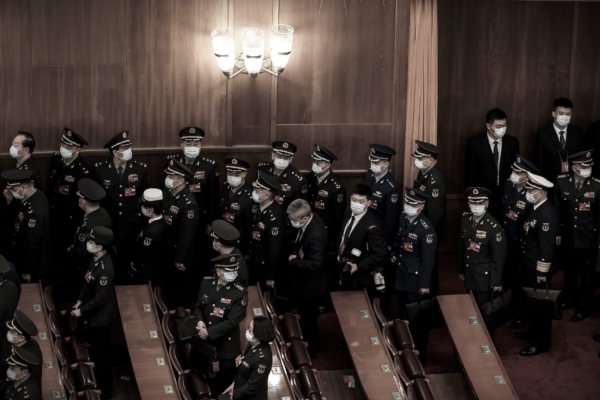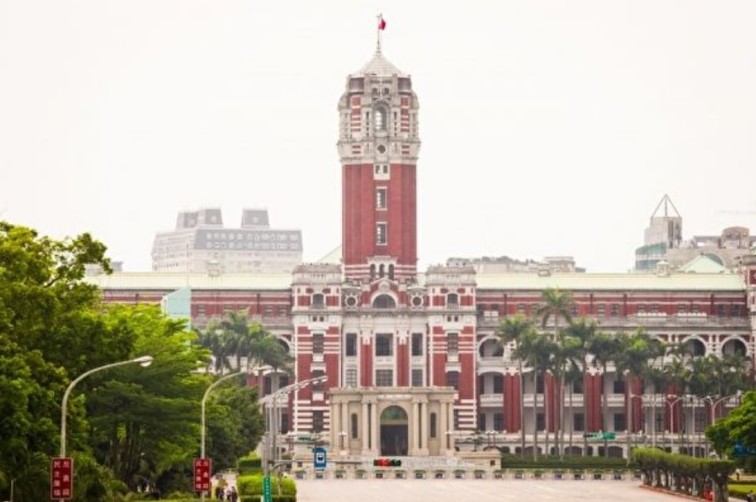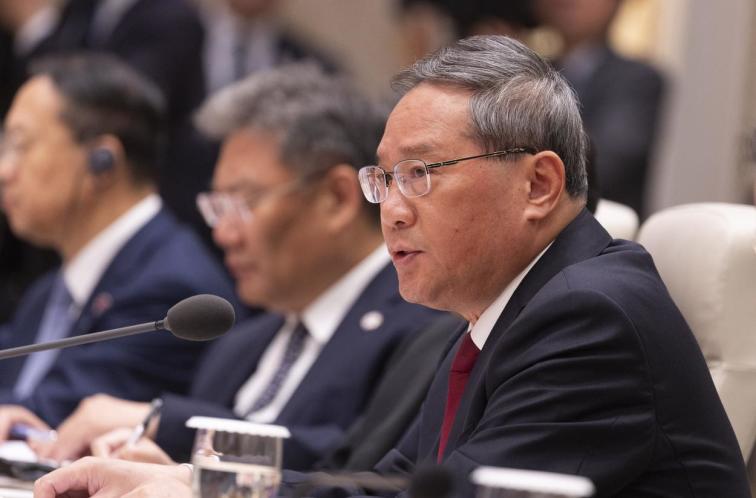The image shows Chinese military delegates departing after the National People's Congress session on March 5, 2023. (Lintao Zhang/Getty Images)dajiyuan
[People News] The recent sudden announcement that Ma Xingrui has been removed from his post as Party Secretary of Xinjiang has drawn widespread attention. The official reason cited is that he will be "assigned to another post." Analysts suggest that Ma may either be reassigned to a symbolic position or promoted even further. The unpredictability of the CCP’s top-level political dynamics aside, Ma Xingrui's network within the political elite — cultivated over the years — may far exceed what most people imagine.
Ma Xingrui, 66, is a native of Yuncheng, Shandong Province. He holds a doctorate in engineering from the Harbin Institute of Technology, where he studied general mechanics in the Department of Aerospace Dynamics. He has served in key positions such as Deputy Director of the Fifth Academy of China Aerospace Science and Technology Corporation (CASC), Deputy General Manager, and later General Manager of CASC (2007–2013). He then became Vice Minister of Industry and Information Technology, Director of the China National Space Administration, and Director of the State Administration for Science, Technology and Industry for National Defence (SASTIND). In 2013, he was appointed Deputy Party Secretary of Guangdong, then Party Secretary of Shenzhen and later Governor of Guangdong Province. In 2022, he succeeded Chen Quanguo as Party Secretary of Xinjiang and became a member of the CCP Politburo during the 20th National Congress.
Although Ma's ancestral home is in Yuncheng, Shandong, he was born in Shuangyashan, Heilongjiang and spent much of his life in northeast China. Despite his academic background, Ma is far from a "bookish" type. His Shandong forthrightness combined with a Northeast-style outgoing nature made him highly effective in navigating the bureaucracy.
Ma maintained strong relationships with both subordinates and superiors. His former deputies like Yuan Jiajun (at CASC) and Xu Jin (in Shenzhen) later rose through the ranks with his support. Superiors such as Zhang Qingwei (at CASC), Hu Chunhua, and Li Xi (in Guangdong) also held him in high regard.
At CASC, Ma had to coordinate with powerful bodies like the PLA’s General Armaments Department, SASTIND, SASAC, the National Development and Reform Commission, and the Ministry of Finance — as well as manage relationships with dozens of peer organisations. He excelled at this balancing act.
Gaining the trust of top CCP leaders is extremely difficult. These leaders are surrounded by sycophants and sweet-talkers every day. To become one of their trusted insiders, one must either share long-standing personal history or pass some sort of "test" — usually during critical moments or through benefits provided to their families.
Crude methods like handing over cash or gifts are risky. High-level influence involves sophisticated, legal-sounding benefit transfers. Ma Xingrui is a master of this art.
In 2010, Ma Kai’s daughter, Ma Le, planned to start a private equity (PE) firm but hit a wall with central SOEs.
At the time, Ma Xingrui was Party Secretary at CASC. He arranged for a subsidiary to create a joint venture to manage the aerospace industry fund, allowing the management to hold equity, implement performance incentives, and promise non-interference. It effectively became a "private garden" for Ma Le.
Originally, this would have been unimaginable for a quasi-militarised state-owned enterprise in the defence industry. However, Ma Xingrui’s astuteness allowed him to see that this was a move with no downside. Investing in the aerospace-related sector through the fund aligned with national policies and went through all the proper procedures. By channelling the investments through a subsidiary, any potential fallout would be shouldered by the subsidiary. Moreover, having a flexible and responsive fund to invest in peripheral industries objectively benefited the overall development of the aerospace sector.
Ma Le, a Peking University graduate with experience at China Investment Corporation (CIC), was known to be discreet. It’s rumoured her godfather is Wang Qishan. With a powerful father and a political titan for a godfather, Ma Le’s backing was formidable. Through this deal, Ma Xingrui won the trust of the Ma Kai family.
Ma Kai, a former NDRC director, State Council secretary-general, and vice premier, was chief aide to premiers Zhu Rongji and Wen Jiabao and well-connected with princeling elites. Gaining such ties cannot be bought with money.
More importantly, Ma’s strongest political connection is with Peng Liyuan, Xi Jinping’s wife. Official bios list both as hailing from Yuncheng, Shandong — although Ma may have rarely visited. Nevertheless, this helped him integrate into the influential "Yuncheng circle" in Beijing.
Ma is close to Peng Liyuan’s brother-in-law Xu Xingjian and Zhang Jianchun from the CCP’s Organisation Department. He often addresses Peng as “Big Sister.” So, how did Ma break into the inner circle of China's First Family?
In 2016, due to years of continued losses, China Cinda Asset Management Co., where Xu Xingjian held a senior position, was looking to offload its subsidiary, Cinda Insurance. However, finding a suitable buyer was extremely difficult because property insurance licenses were far less valuable than life insurance licenses. Private companies were unwilling to take over the firm, and state-owned enterprises generally avoided acquiring companies that had been losing money for years. Finding a buyer both willing and financially capable of taking over the struggling company had become an almost impossible task, but Ma Xingrui managed to accomplish it in a completely unexpected way.
At the time, Guangdong Governor Zhu Xiaodan was about to retire, and Ma Xingrui, then Party Secretary of Shenzhen, was in a critical phase of competing for the governorship. He needed to quickly align himself with General Secretary Xi Jinping, and winning over Peng Liyuan — his fellow native from Shandong — had become a top priority. Upon learning about Cinda Insurance’s transfer plans, Ma immediately instructed Shenzhen’s state-owned enterprise, Shenzhen Investment Holdings Co., to begin negotiations with Cinda Asset Management. On December 27, 2016, Shenzhen Investment acquired shares in Cinda Insurance, spending 4.2 billion yuan — nearly three times the company’s market valuation. For a company that had posted losses for eight consecutive years, had a nearly worthless license, and was being urgently dumped by its shareholders, why would Shenzhen Investment pay such a high premium?
Because for Shenzhen Investment, this wasn’t a business deal — it was a political mission. Therefore, it wasn’t judged on economic grounds. Just three days later, on December 30, Ma Xingrui was appointed acting governor of Guangdong Province and promoted to full ministerial rank. Reportedly, the only condition Shenzhen Investment proposed during negotiations was that Xu Xingjian must remain as chairman of Cinda Insurance for at least two more years. While this may have seemed unreasonable, it was entirely legal. Since Cinda Asset Management was also a state-owned enterprise, the excess funds essentially just moved from one pocket of the state to another. The decision was made autonomously by a company under the State-owned Assets Supervision and Administration Commission (SASAC), and even if anything went wrong, the responsibility wouldn’t fall on the Party Secretary. Strangely enough, once Cinda Insurance was transferred to Shenzhen Investment, it quickly turned around its losses, and the value of its insurance license appreciated.
Former Central Military Commission Vice Chairman Xu Qiliang is also from Yuncheng, Shandong. Through Peng Liyuan, Ma became close to Xu — they often drank together. Xu’s daughter frequently sought Ma’s advice.
These events reveal Ma’s political style: he solves leadership crises skillfully, fulfils their expectations, protects himself legally, and even benefits the state. Such capabilities naturally earned him favour at the highest levels.
Ma’s career wasn’t without turbulence. In December 2015, just nine months into his Shenzhen post, the Guangming landslide killed 73 people and injured 16. The State Council declared it a man-made safety incident. Ma seemed at risk of disciplinary action, but thanks to his connections, only a vice mayor was penalised.
On November 24, 2022, a fire in Urumqi’s Jixiangyuan community killed 10 and injured 9. The tragedy sparked China’s White Paper Movement, leading to the abrupt end of the “zero-COVID” policy on December 7. But this did not derail Ma’s political path.
In October 2022, the U.S. Air Force's China Aerospace Studies Institute (CASI) published a 255-page report detailing the PLA Rocket Force’s command structure, units, missile types, and coordinates. This triggered a wave of corruption investigations involving the Rocket Force, Equipment Development Department, aerospace SOEs, and related universities. Some speculate that Ma Xingrui’s removal from Xinjiang may be linked to this aerospace-related corruption probe. If true, the question remains: can his powerful political network once again ensure a safe landing?











News magazine bootstrap themes!
I like this themes, fast loading and look profesional
Thank you Carlos!
You're welcome!
Please support me with give positive rating!
Yes Sure!